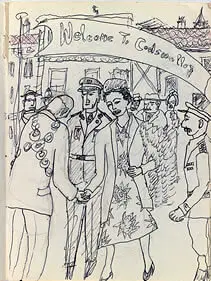The origin of the term ‘codswallop’ is unclear. The most widely quoted
story is that of Hiram Codd, an English soft drinks maker during the 1870s, who developed a technique
for bottling lemonade. This process involved the insertion of a glass marble as a stopper into the neck of
the bottle. When the bottle was shaken the resulting pressure from the fizzy pop forced the marble
against the neck to form a seal.
The device was called, not unreasonably, the Codd Bottle.
‘Wallop’ is a slang term for
beer, and beer drinkers would certainly be disdainful of bottled soft drinks. This slang term dates from the early to mid 20th century. This is the earliest I’ve found in print, from the Nottingham Evening Post, March 1930:
Policeman (giving evidence at Tottenham on what he heard in a club): The waiter came in with a tray of glasses of beer and shouted, “Any orders, gents, for hops and wallop?”.
It’s not difficult to
see how a soft drink in a Codd Bottle could have come to be called codswallop, but there’s no actual evidence for that derivation. In fact, such neat plausibility without evidence is often the mark of the linguistic mythology known as folk etymology. Look no further than these popular fallacies for confirmation.
The phrase probably originated in post-WWII Britain. The earliest reference that I can find to it in print is as the title of a sketch by the Anglo-Australian artist Richard Larter, which he created in 1958, while still living in England.
‘Load of Codswallop’ gained more currency the following year, in the script of a 1959 episode of the popular UK television series ‘Hancock’s Half Hour‘. The writers Galton and Simpson don’t claim to have coined the phrase, which they say was in public circulation when the show was broadcast.
‘A load of codswallop’ sounds old and the Hiram Codd story has a certain appeal. The problem with the tale, apart from the lack of any supporting evidence, is the entirely implausible notion that the phrase was in popular circulation since 1870 but somehow didn’t manage to get into print until 1959 – an appeal for earlier citations made on national television in the UK in 2006 failed to uncover any earlier than this date. Also, if Mr. Codd’s drink were the derivation, we would expect to find early examples of the name in the form Codd’s Wallop, but there aren’t any such examples. That, along with the fact that the term ‘wallop’ itself wasn’t associated with its ‘drink/beer’ meaning until well after Codd’s death, makes the ‘Codd’s Wallop’ derivation highly improbable.
The most likely explanation is that it is a made-up nonsense word that just sounds right for its meaning.
‘Cod’ is a little-used slang word meaning ‘to hoax or take a rise out of’, known since at least 1873. It was used in much the same way we now use the verb ‘to kid’, as here in a quotation from 1884:
“Tha’st only coddin me as tha allus does; tha’l none tay me to see th’ fair.”
That could be the origin of the cod in ‘codswallop’, but this is just plausible speculation, which brings us back full circle.

